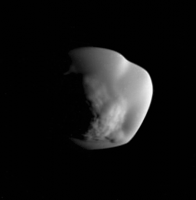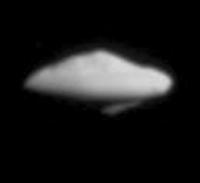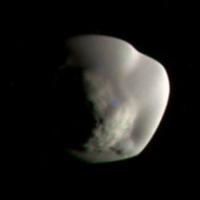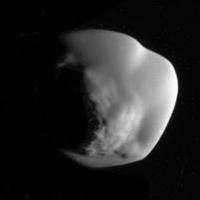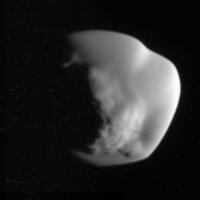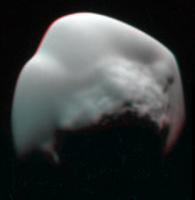Printable Version of Topic
Click here to view this topic in its original format
Unmanned Spaceflight.com _ Cassini's ongoing mission and raw images _ June 12 2007 Icy Moons (rev 46)
Posted by: alan Jun 6 2007, 07:35 AM
Rev 46 description available at CICLOPS
http://ciclops.org/view.php?id=3245
Some highlights:
Cassini will observe Mimas, the innermost of the mid-sized icy satellites of Saturn
June 12, Cassini makes one of its closest passes of the small, inner satellite Atlas, at a distance of only 38,000 km (24,000 mi). With an average diameter of only 31 km (19 mi), Atlas is one of the smallest moons of Saturn. Atlas will only appear to be 120 pixels across (at the equator). However, these images may still provide important clues about the formation of one of the most distinguishing aspects of the tiny satellite: its equatorial bulge. The bulge is thought to have been created by material from Saturn’s A ring being deposited preferentially along the equator of the satellite.
A number of observations are dedicated to observing some of Saturn's small moons, in order to refine scientists' estimates of their orbital paths. These sequences include observations of some of Saturn's outer satellites, such as Paaliaq, Hati, and S/2004 S13
I've seen a few of these small outer moons listed recently on the raw image page. They search tool only shows them from the last few orbits. Is this something new they are doing or have they been previously listed as Sky?
Posted by: jasedm Jun 7 2007, 07:01 PM
I think it's a recent decision to attempt to pin down the orbital dynamics of some of the newly discovered moons. To my knowledge the mission so far hasn't included any observations of these captured rocks. But out at apoapsis, it strikes me as a good use of the spacecraft's time.
It's a shame no observations are planned on this orbit of Prometheus - the only named moon so far not imaged appreciably better than Voyager managed. I believe the spacecraft comes within 65,000km of Prometheus on June 12th - evidently better opportunities are available later on (including a sub 50,000km pass on June 28th this year).
Posted by: volcanopele Jun 7 2007, 07:13 PM
Sorry, no dice AFAIK for Prometheus. The June 12 encounter unfortunately occurs at the same time as the Atlas encounter, and the Rocks/Rings folks chose to image Atlas. The June 28 encounter occurs a very high phase angle. Can't check to see if observations are still planned, but at C/A, you would only see a thin crescent.
EDIT: LOL, I found another good reason why there is no imaging during June 12 encounter: Prometheus is in eclipse at the time. ![]()
Posted by: jasedm Jun 7 2007, 08:09 PM
Right decision I think to go for Atlas on this orbit VP, if that was the choice. There's only one closer pass to Atlas (including the EM), but many more opportunities for imaging Prometheus close up and at a decent phase angle.
Must be a difficult job being a mission planner sometimes!!
Posted by: Decepticon Jun 13 2007, 09:19 AM
Some distant looks at Mimas. http://saturn1.jpl.nasa.gov/multimedia/images/raw/raw-images-list.cfm?browseLatest=0&cacheQ=0&storedQ=0
Posted by: ugordan Jun 13 2007, 09:36 AM
Atlas images are in. It doesn't look very saucer-shaped in this geometry.
http://saturn1.jpl.nasa.gov/multimedia/images/raw/raw-images-details.cfm?feiImageID=113545
Pretty noisy, too.
Posted by: MarcF Jun 13 2007, 10:07 AM
Amazing !!
The surface is so smooth. Only few craters might be seen near the terminator.
It seems completely covered by "ring snow".
And where is the equatorial ridge ?
Marc.
Posted by: ngunn Jun 13 2007, 10:46 AM
Presumably around the perimeter of that image.
Posted by: pat Jun 13 2007, 12:16 PM
I've seen a few of these small outer moons listed recently on the raw image page. They search tool only shows them from the last few orbits. Is this something new they are doing or have they been previously listed as Sky?
The outer irregulars have been imaged before and yes the target was listed as 'SKY' meaning that the target was a RA/dec coordinate. One of the German group on the Imaging Team has recently begun observing the outer irregulars to get photometry, rotation curves etc and the observation designs for these are specifically targetted to the satellite of interest hence the name appearing as the target. I think that the Cassini observation design software may have only recently been updated to accept the outer irregulars by name as valid targets.
Posted by: pat Jun 13 2007, 12:26 PM
Looking at these images it may be that it isn't an equatorial ridge at all but that Atlas is pear shaped with bulges at the equator at roughly the sub-Saturn point and 180 degrees from the sub-Saturn point (anti-Saturn point?). The geometry in the latest images has us looking almost straight 'down' onto the 'bulge' facing away from Saturn. It reminds me of satellite imagery looking down on a mountain. Possibly the 'bulge' is cone shaped.
So maybe Atlas is roughly spherical with two large cones stuck on pointing towards and away from Saturn.
Posted by: volcanopele Jun 13 2007, 03:06 PM
We are looking down on the southern hemisphere of Atlas. The equatorial bulge is the smooth periphery of the image. The south pole is within the rougher bump seen at the center of the disk.
Posted by: pat Jun 13 2007, 03:33 PM
Yep, I typed before I'd actually done some work on the geometry. Volcanopele is right, we're pretty much looking down on the south pole so the images are entirely consistent with an equatorial bulge of newer, smoother material ontop an older more eroded ellipsoid. The 'saucer' is back and the 'lemon' out the window. Ah well, it was nice while it lasted.
Posted by: MarcF Jun 13 2007, 03:37 PM
OK, thanks. Now I see the perspective.
We can imagine that the actual moon corresponds to the rough core, and the smooth belt to catched ring particules.
Marc.
Posted by: Ian R Jun 13 2007, 04:09 PM
Here's a version of the picture created from several stacked images. The noise has been removed from each indivdual layer:
Posted by: elakdawalla Jun 13 2007, 04:41 PM
Why is there so much noise in the images -- is it just because we're real close to Saturn and there's lots of charged particles flying around?
I checked the tour page and it appears that periapsis this time around was at 2.7 Saturn radii. We haven't been this close to Saturn since Rev 14 (there was a nice http://saturn.jpl.nasa.gov/multimedia/images/raw/raw-images-details.cfm?feiImageID=49040 flyby then, and I note those images were also noisy).
--Emily
Posted by: jasedm Jun 13 2007, 06:02 PM
Fascinating little moon - looks like it's been hoovering up ring particles for aeons. Small point, but the distance to target quoted (180,000km) is clearly not correct - these shots are a helluva lot closer than that. I hope we get some additional shots later in the mission with a different viewing geometry. Thanks Ian R for the stacked and cleaned image - very nice.
Posted by: volcanopele Jun 13 2007, 06:06 PM
The distance is around 42,000 km.
Posted by: Littlebit Jun 13 2007, 07:48 PM
It's not noise - Atlas has decided to outgas, too
Posted by: dilo Jun 13 2007, 08:32 PM
Thanks Ian for the beautiful Atlas staked image.
Is one of the oddest and most fascinating things I ever looked to! ![]()
Posted by: Exploitcorporations Jun 13 2007, 09:45 PM
Very nice Ian!
Here's an enlarged version of the what I think is the best prior view of Atlas from June 2005 for anyone who hasn't already seen it. Pretty sure south is at the top in this one.
Posted by: belleraphon1 Jun 13 2007, 10:14 PM
Yes, thanks Ian...
This is just stunning!!!! Wish I could crawl (what would the word be for pulling one self along a moonlet so small we are talking microgravity... you poets out there... can you find a word??? Stu???) along that polar cusp and watch ring material "fall" along the equator like an eternal snow squall ... would almost beat out hiking Headlands!!!!!! ![]()
WOW.
Craig
Posted by: Stu Jun 13 2007, 10:48 PM
Hmmm... "bellying"? or, with all those teeny bits of rock and dust scruffling under you, how about "skree-ping"? Or, thinking back to the movies...
"Golluming"?
Posted by: elakdawalla Jun 13 2007, 11:35 PM
My own versions of the two best Atlas images to date, http://www.planetary.org/blog/article/00001003/. I'm not convinced that my putting them in color brought anything to the party...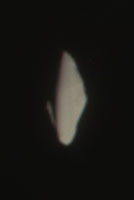
--Emily
Posted by: belleraphon1 Jun 13 2007, 11:36 PM
"Golluming"
I like that. I am sure a whole new vocabulary will evolve when people actually get around to golluming
moonlets like this..... similar to terms used in moutain climbing, only these mountains are flying. The trick willl be to stay in contact rather than just float along. Edging and smearing along the spindrift and scree,
and not become a permanent addition to the gravel pit. And in the vicinity of rings, kevlar suits will be mandatory (any one know the velocity of ice grains colliding and adding to this moonlets girth?)...
sorry Doug... I know this speculaton and dreaming is way off topic.... but sometimes cannot help but muse what fun our descendants may have.... about which we can only imagine...
Craig
Posted by: belleraphon1 Jun 13 2007, 11:44 PM
Emily...
I like the color.... definitely adds to the party... assume the blue specks along the pole are artifacts.....
Atlas seems to be swirling himself together like wrapping a turban around his girth. I will bet this moonlet has changed it's aspect many times since the rings were born.....
Craig
Posted by: belleraphon1 Jun 13 2007, 11:47 PM
Emily... just looked at your blog and got the answer to my blue spots... I should read before I comment...
Craig
Posted by: lyford Jun 14 2007, 12:08 AM
Hmmm, you don't happen to be a http://www.imdb.com/title/tt0344651/quotes fan, do you?
The color makes it seem more like being there, which is always a good thing for us enthusiasts.
Posted by: elakdawalla Jun 14 2007, 12:21 AM
In fact I am a Good Eats fan -- didn't realize I was parroting Alton Brown there!
I'll bet AB was a fan of Mr. Wizard too.
--Emily
Posted by: AlexBlackwell Jun 14 2007, 12:26 AM
Hey, that's one of my favorite shows! I like the episode a few years back when he was stranded on a deserted island à la http://en.wikipedia.org/wiki/Cast_Away.
No doubt. And I know he is a big http://en.wikipedia.org/wiki/MacGyver fan.
Posted by: nprev Jun 14 2007, 04:12 AM
"Golluming"?
Gotta add: "skimming". Let's say, and why not, that you're in a spacesuit on the surface of this moon with which you have barely any gravitational connection. You reach out in front of you to a small encrusted projection, barely a minor ridge within your formerly terrestrial frame of reference but a mountain here...and you pull on it as if you were diving along a coral reef...and you move with surprising velocity over the snowy surface, at an altitude of centimeters, looking for the next ridge to shove you ever onward...
Blissful. A deep dream come alive. Float almost effortlessly across a surface, and scoop a handful of the rings of Saturn as you pass by, glance up and see Saturn huge in front of you, the major moons as bright stars or perhaps barely resolvable tiny crescents if you're particularly lucky...who could want anything more?
Posted by: dvandorn Jun 14 2007, 07:15 AM
I dunno -- it seems to me that to move across the surface of a small body which has such little mass that it's truly what I would call a microgravity environment, you can't rely on the possibility that you will encounter a natural handhold when you need to slow down, stop, or change directions. Grab hold of a rock sitting on the surface, and you're not going to stop yourself, you're going to pull the rock off of the body and bring it with you.
I think you'd have to somehow implant anchoring stakes on such a surface and string lines between the stakes. The stakes would have to be driven deeply enough to be able to stay anchored as the mass of your body, plus your environment suit, pulls at them with the force of your momentum. So it looks like small bodies may have to be "prepared" for human exploration before anyone can actually touch them and maneuver around on them.
This wouldn't just apply to small icy bodies like Atlas, but to most small bodies like asteroids and comets. You'd have to pre-emplace anchors and lines in order to safely move around the surfaces of such bodies. Otherwise, you'd either fly right off (though I imagine you'd be tethered to your ship) or you wouldn't be able to easily maneuver to the location on the surface you want to visit.
Your other option, of course, would be to use something like the AMU, a self-contained, RCS-controlled backpack that would move you along the surface and automatically adjust for the tiny pull of the body you're studying. It would be more like flying along, facing an icy or rocky wall, than "walking" on the body.
-the other Doug
Posted by: Exploitcorporations Jun 14 2007, 07:50 AM
Blissful. A deep dream come alive. Float almost effortlessly across a surface, and scoop a handful of the rings of Saturn as you pass by, glance up and see Saturn huge in front of you, the major moons as bright stars or perhaps barely resolvable tiny crescents if you're particularly lucky...who could want anything more?
Toyota (smack)
That's nifty, nprev. I want a picture of this.
Posted by: belleraphon1 Jun 14 2007, 11:42 AM
Blissful. A deep dream come alive. Float almost effortlessly across a surface, and scoop a handful of the rings of Saturn as you pass by, glance up and see Saturn huge in front of you, the major moons as bright stars or perhaps barely resolvable tiny crescents if you're particularly lucky...who could want anything more?
Very nice nprev.... you expressed exactly what I felt and saw in my minds eye.
Thanks Stu for the term "golluming"...
And dvandorn is correct that moving along the surface of small bodies will be quite a challenge. Which is EXACTLY why it will someday be done and built its own ethic, technique, and terms.... fun to think about.
But for now I will just delight in nprev's words and my mental play...
Craig
Posted by: jasedm Jun 14 2007, 06:14 PM
I reckon that Pan and Daphnis may look pretty similar in close-up, with Pan (based on far-out images so far) being an even more extreme case than Atlas with the whole snow-girdle thing.
I'm going to show my ignorance here, but presumably Atlas is not tidally-locked to Saturn, leading to roughly equal accretion of ring particles around the equator, rather than them piling-up preferentially on the leading hemisphere. If not tidally locked, then it lends wait to the theory of the rings (and embedded moons) being the result of the disruption of a body that wandered too close to Saturn, and that the rings themselves are a (cosmologically) fleeting phenomenon that we're very privileged to see.
Posted by: volcanopele Jun 14 2007, 06:51 PM
Actually, Pan is lemon-shaped.
Posted by: AlexBlackwell Jun 14 2007, 06:53 PM
I thought it was lime-shaped.
Posted by: Stu Jun 14 2007, 08:00 PM
Just wondering... does anybody else live in a constant sense of amazement at the things we see now? I mean, every time we think we've seen the strangest of the strangest, the weirdest of the weird, the universe taps us on the shoulder and whispers "Pssst... look over there..." and we turn around and there's some gorram unbelievably freakish impossible new weirdest of the weird thing staring at us from the Black... ![]()
When I was young and saw my first pictures of Olympus Mons and Valles Marineris I thought they were the most amazing things I'd ever seen, or would see. In the years that followed I saw phlegmy volcanoes of bubbling sulphur on Io... the cracked frozen-coffee surface of Europa... Earth as a "pale blue dot" from the edge of the solar system... a "Death Star" orbiting Saturn... the "Pillars of Creation" through Hubble's eyes... the surface of Titan, the crumbling cliffs and steep slopes of a half mile wide crater blasted out of Mars, Earth as a "star" through a gap in Saturn's rings, the sun setting behind mountains on Barsoom, Europa rising up like a phantom from behind the limb of Jupiter, streamers and ribbons of blue flame inside then plume of a volcano vomiting out of Io...
... and now this, this tiny Saturnian moon of crackling ice and accumulated scrunching snow that looks like every UFO I ever drew on the covers of my school exercise books as a kid...
Seriously, I mean it, does anyone else ever just sit back from their screens, looking at these images, and think...
Unbelievable... just unbelievable...
![]()
Posted by: climber Jun 14 2007, 09:08 PM
Yes Stu, we must admit that Nature has much more immagination than us, poor humans. I've been told of this a long time ago but I'm sure the one that told it too me would be washed away again and again as I am. This is the beauty of unmanned spaceflight : get close to "objects" no reachable in the immediate future directly by humans... this is why I log so often here on UMSF (1001 and counting...)
Thanks again Stu for sharing your feelings so emotionaly
Posted by: belleraphon1 Jun 14 2007, 10:22 PM
Stu...
I have been seeing the marvelous and bizzarre since the 60's.... that first look at Earth from the Lunar Orbiters.... aahhhhhhhhhhhhhhh have to run but...
yes, even though I am older than the space age, I am still constantly amazed and grateful for living in this time.
And I am constantly blown away by what I see and what is hinted at to come and who knows what wonder tomorrow will bring.....
and glad to be an UMSFer.
Craig
Posted by: dvandorn Jun 15 2007, 03:27 AM
Yes, Stu. I do.
Reminds me of a song lyric from the musical "1776":
"Is anybody there?
Does anybody care?
Does anybody see
What I see?"
-the other Doug
Posted by: Gsnorgathon Jun 15 2007, 03:57 AM
Not sure if Atlas is tide-locked or not, but I could see an initially tide-locked Atlas piling so much stuff up on its leading face that it would then have to rotate to maintain equilibrium; and then gradually becoming tide-locked again. Atlas may alternate between tide-locked and asynchronous rotation. The odd cross-section of Atlas's equator may be hinting at this.
Posted by: Gsnorgathon Jun 15 2007, 04:00 AM
I thought it was http://www.imdb.com/title/tt0071853/quotes.
Posted by: lyford Jun 15 2007, 04:00 AM
OK... this is getting too weird - Alton Brown, Cohen Bros. films, 1776, Monty Python.... all faves of mine. I hate to say it but there appears to be an elite eclectic cultural demographic shaping up here at UMSF. All I need to find is a Swann and Flanders fan here... ![]()
Posted by: Stu Jun 15 2007, 07:26 AM
ON ATLAS’ SHOULDERS…
To their visor-shielded eyes as they approach me -
their gaze constantly drawn away by Saturn’s
swirled-syrup clouds and icy, jewelled rings – I’ll seem
a thing bizarre; a saucer-shaped albino freak
drifting meekly through the dark, peeking
at the planet’s pastel-painted face from the safety
of ring-shadows wide enough to swallow worlds…
But when Sol rises from behind - then blazes above –
my peaks they will see me as I really am: proud and noble
Atlas, a Titan’s tortured son, born of ice and dust,
a hoarfrost-crusted starstone left weary beyond words
from carrying the sky upon hunched shoulders
of ancient rock and boulders, draped by layers of ring-snow
folded over and over and over…
Finally, after a nervous landing they will stand on me,
turn their visors to the sky - but see only black:
Saturn’s sulking, bulging bulk an ink stain
on the star-sewn cloth of night, an Ultreyan
abyss in the sky spotted here and there by flashbulb
lightning sparks against the darkness; fluttering
auroral flames playing round its poles while his rings,
a razor-thin blade of flaming, brittle light, slice him clean in two –
- until finally bright Sol appears, spears of light
stabbing out from behind Saturn’s great curved limb for
a heartbeat before the star itself explodes into view.
A nuclear fireball of purest white, God’s floodlight
shining on my landscape! No escape now from
the Truth: they stand upon a tiny world, an ice grain
whirling round a whale, pale and frail against its side…
Look, they’ll cry – snow! and staring at the sky
will see a billion firefly specks drifting through the high
vault of the heavens; playful faeries flitting in the light
of Saturn’s sudden dawn, each flickering flake
a refugee fleeing from the planet’s rings;
too-small-to-fall-in-anything-but-silence things
that on their own are nothing, but over aeons
have gathered round me like a skirt of dirty lace.
And golluming over me, belly-sliding over the crumping snow
they'll know, and feel it in their brittle bones that gravity is but
a memory here, out where the air is thick with flakes
of Saturn's Death Star'd moon...
![]()
Posted by: ngunn Jun 15 2007, 08:58 AM
Posted by: Bjorn Jonsson Jun 15 2007, 12:06 PM
Well, I'm amazed and Cassini has been probably the best ever example of this.
A related observation: I'm amazed at just how different all of these satellites/solar system bodies (and not just those at Saturn) can be from each other, especially when they get reasonably big, say 250+ km in diameter (or length). In fact I probably cannot think of any two solar system bodies above that size that I would have even the slightest difficulties recognizing in global images (unless the resolution were really low). Somehow they each have their own 'personality'. Years ago people expected lots of 'Rheas' out there but instead you've got things like Enceladus, Iapetus, Hyperion and Dione which are totally different from each other (and Titan in a class of its own). The same is true at Jupiter, Uranus and Neptune. Every solar system object seems to be interesting in some way.
Posted by: ngunn Jun 15 2007, 01:28 PM
Stu, I share that sentiment 100 percent. Broad brush descriptions of categories of Solar System objects are of very limited use once the details hove into view. Every world and mini-world has a unique history to tell of chance and circumstance within the celestial pinball machine. We live in an age of revelations indeed. Who could not be moved?
Posted by: Phil Stooke Jun 24 2007, 01:37 AM
I did a bit of cleaning up and stacking of the Atlas images. Here are the results. The earlier posts were just as good - or better! - but here the significant thing is slight differences between the two views - from the early and late frames of the sequence. I'm not yet sure if a stereo view from these is any good.
Phil
Posted by: elakdawalla Jun 24 2007, 01:56 AM
I looked at these in crossed-eye stereo, and I can't decide if I see anything in 3D or if I'm just interpreting shape from shading. I guess maybe there is 3D information contained in the stereo pair, but that the difference in the two points of view is not enough to produce more than a subtle 3D effect.
Nice versions though, much better cleaned up than mine.
And, might I add, what a bizarrely shaped body! Lumpy and smooth at once.
--Emily
Posted by: Phil Stooke Jun 24 2007, 07:29 PM
If there is anything in it, I think it has to be this way round:
Phil
Posted by: tedstryk Jun 24 2007, 08:53 PM
What a strange moon!
Posted by: David Jun 24 2007, 09:28 PM
I'm not sure if I got this right, but I gather that Atlas is shaped something like a spinning-top, with a broad disk shape in the center and two "horns" or mountains on the opposite poles.
If so, then there's an interesting process going on: Atlas is picking up ring particles, of various sizes, on the disk edge, but once accreted they find themselves gravitationally at the furthest point from Atlas' center of gravity; if the are large and massive enough so that they don't easily stick to neighboring particles, they will find themselves rolling (slowly) toward the tops of the "mountains", which paradoxically are gravitationally down. As a result, any large lumpy bits are going to gravitate toward the poles, leaving a smooth equator covered in smaller particles and ring-dust.
Does that sound about right?
Posted by: The Messenger Jun 24 2007, 09:57 PM
Unbelievable... just unbelievable...
Unbelievable, or removed from decades of preconception? Wasn't it reasonable, given the standard explanation for how the solar system formed, to assume the moons of Saturn would be a rather dull and homogenious lot? Isn't it more reasonable now to assume Phoebe and Titan may have much more vivid histories; and each of the 'icy' moons of Saturn has their own province?
Posted by: Phil Stooke Jun 24 2007, 11:58 PM
David, I think you are combining things which have been said about other small bodies here - a rapidly spinning elongated object, rotating about its short axis, may have the ends of its elongated shape gravitationally lower despite their larger radii. Peter Thomas of Cornell did pioneering work on this phenomenon, which he called dynamic topography, especially with reference to Phobos, Deimos, Gaspra and Ida, in the 90s.
Until new we have not known the shape of Atlas well enough to think about it in this context. My impression is of a "flying saucer" shape with a central bulge - the wrinkly bit we see here - and a big equatorial ridge which now looks as if it extends all around the equator, though a bit irregular. That ridge may be made of ring particles deposited on the satellite, maybe during special events in the history of the system such as an interaction with a ringlet. At this distance from Saturn the dynamic topography would be dominated by Saturn's gravitational gradient across Atlas plus its rather rapid rotation. I'm sure we will see more on this when a full shape model can be constructed.
Phil
Posted by: tasp Jul 30 2007, 01:18 PM
Gee, if they are looking for things to do during the extended extended extended mission, a close approach by Cassini to Atlas would be a possibility.
I realize to be close, we would also be close to ring plane crossing, and they like to orient Cassini with the dish forward to absorb the particles, and this would mess up getting a meter or sub meter resolution picture of the accumulated ring goodies.
Just a thought, but would the radar instrument yield useful data on the surface texture, sufficient for use to infer the shapes of the accumulated ring particles ?
This is a unique opprotunity to possibly 'image' Saturnian ring particles and we might want to put some effort into considering this . . .
Posted by: tasp Aug 1 2007, 03:12 AM
Just curious musing here:
Would an impact into the accumulated dust donut knock off quite a bit of it, and then might it go back into orbit around Saturn and then re-accrete (re-re-re-accrete ??) back on to Atlas?
Cool if we have a recursive phenomena here.
Is the process of re-accretion going on right now ??
Powered by Invision Power Board (http://www.invisionboard.com)
© Invision Power Services (http://www.invisionpower.com)

